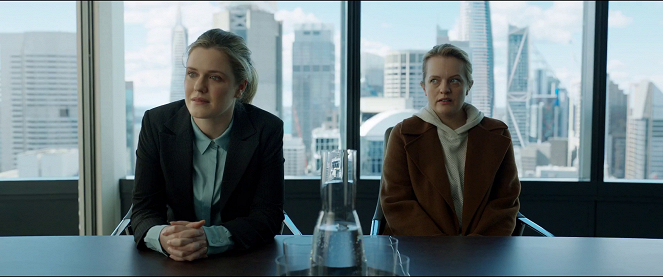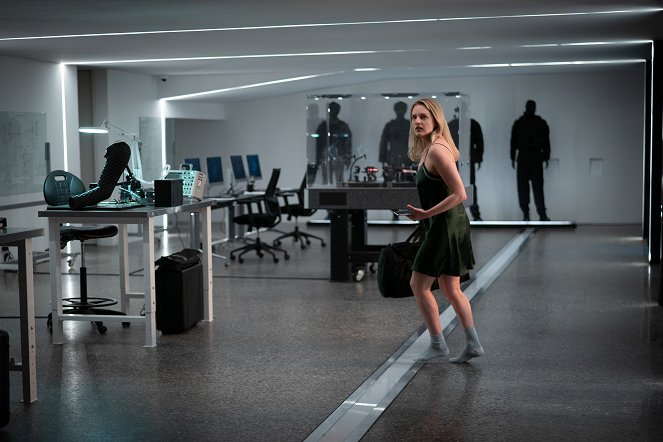Directed by:
Leigh WhannellScreenplay:
Leigh WhannellCinematography:
Stefan DuscioComposer:
Benjamin WallfischCast:
Elisabeth Moss, Oliver Jackson-Cohen, Storm Reid, Aldis Hodge, Harriet Dyer, Benedict Hardie, Anthony Brandon Wong, Amali Golden, Michael Dorman, Sam Smith (more)VOD (3)
Plots(1)
Trapped in a violent, controlling relationship with a wealthy and brilliant scientist, Cecilia Kass escapes in the dead of night and disappears into hiding, aided by her sister, their childhood friend and his teenage daughter. But when Cecilia’s abusive ex commits suicide and leaves her a generous portion of his vast fortune, Cecilia suspects his death was a hoax. As a series of eerie coincidences turns lethal, threatening the lives of those she loves, Cecilia’s sanity begins to unravel as she desperately tries to prove that she is being hunted by someone nobody can see. (Universal Pictures US)
(more)Videos (11)
Reviews (12)
The Invisible Man captures your attention thanks to the great atmosphere and, of course, Elisabeth Moss' evocative performance as Cecilia. Unlike most horror films (or thrillers), the film is not based directly on the fear of what we will see, but of what we will not actually see – to put it in a rather trite way – which it manages to do in a very artful way. Together with the protagonist, we look into empty doors or corridors and wait to see who or what will appear. Elisabeth Moss, thanks to her unmistakable looks, was a great choice for the role of a woman who is suddenly not at all sure of what is happening around her and doesn't know if she is slowly losing her mind. Towards the end, I felt that the plot started to lose its breath a bit, but I was more than satisfied with the overall denouement. Last but not least, I have to praise the unmistakable and captivating music, which perfectly completed the dense atmosphere of the film.
()
Leigh Whannell confirms in The Invisible Man that he is a director to be reckoned with as someone who knows the horror genre. But he's still a little short of the best. His new film should have been some twenty minutes shorter, but otherwise it's a not very original but excellently made thriller. Whannell spices up the tension, helped not a little by the excellent Elisabeth Moss, and in the more action-driven scenes he confirms the qualities already hinted at in Upgrade. He also plays fair with the viewer from the start and lays all his cards on the table surprisingly early, but that doesn't stop the rather uncomfortable atmosphere from working. Personally, The Invisible Man sat better with me in the moments where it took itself 100% seriously, because its reliance on atmosphere and a more mature approach to the material really makes it work in a way that most contemporary horror films dream of. But while the whole B-movie feel is perhaps a little too rushed and it reeks a bit of trying to spice things up at all costs, overall this is well above average stuff that shows horror fans that there are still talented directors out there who can tell even a hackneyed story in a way that doesn't bore you for two hours. Although, unfortunately, it probably won't be enough for a new genre classic.
()
This post-MeToo reinterpretation of H.G. Wells's The Invisible Man transforms the subtext of numerous slasher films and paranoid thrillers (toxic masculinity is evil) into the main theme and, unlike the original story, factors in primarily the viewpoint of the victim rather than that of the attacker. The screenplay was written by a man (director Leigh Whannell), though on the basis of consultation with specialists and victims of stalkers and emotional manipulators. In order to take the feminine perspective into consideration as sensitively as possible, Elisabeth Moss was invited to refine the script. The most terrifying part of the film is its first half, which gives us a hint of the hell experienced by the partner of a person with personality disorder even after the (seeming) end of the relationship and patiently reveals the aggressor’s methods. From the ways that Cecilia’s ex-partner psychologically torments her, destroys her career prospects and isolates her from her family and friends in order to intensify her helplessness, the film is chilling in that it shows how easily such methods can be applied in a world where invisibility has yet to be invented. (Due to his ability to assign blame to the victim, the perpetrator of this form of violence often seems to be absent and invisible, someone who does not actually exist). Compared to other, similar films that keep us in a state of uncertainty until the end as to whether the main character is in fact losing touch with reality (in other words, we have the same doubt that a manipulator tries to induce in the victim through gaslighting), here we know from the beginning that Cecilia is in the right and her cognitive abilities are unimpaired, which together with Moss’s performance and the boldly subjective narration strengthens our affinity for her and the frustration arising from the fact that no one believes her, while someone else takes control of her life step by step with a chillingly premeditated plan. Though the second half of the film is closer in nature to a standard splatter film and the psychological persuasiveness more conspicuously gives way to genre conventions, it is still first and foremost about what the protagonist experiences. Thanks to the viewer’s interest in the main character, the film’s climax works superbly. It is satisfying to see who takes the lead in it and how, as well as in how simply and effectively it is directed (which is true of the whole film; instead of visual effects and scares, extremely inventive use is made of the most basic stylistic elements employed by horror filmmakers: silence and empty spaces, slow panoramic shots, well-timed point-of-view shots). It is a horror film that, in revealing some of the sources of today’s social anxieties, is equally as important as Get Out was a few years ago (as we live in a society that is more trusting of those who are good at pretending than it is of the victims of such pretending). 80%
()
I really don't know who came up with the rule - whenever Elisabeth Moss appears in a movie or series, her character has to be referred to as beautiful at least once. I can have a good laugh about it and life goes on, but then I'm confronted with the close-ups of her face, and I can already count on waking up from sleep screaming, drenched in cold sweat. These shots are also the only explanation why horror is listed as one of the genres. The film itself wasn't exactly amazing, but it wasn't terrible either. If I had been able to root for the protagonist, I might have even enjoyed it more.
()
The brilliantly paranoid direction and cinematography do to the viewer in The Invisible Man what, say, Spielberg's Jaws does to the viewer – the unsettling static shots simply suggest to you that there's someone standing there somewhere who can't be seen. Or are they there? Or there? Really terrific work and, along with the perfectly believable Elizabeth Moss, it is the main triumph of this unassuming but all the more impressive and surprising horror film, which of course deals with serious themes of domestic violence and restraint as much as it does with jump scares. If it had been a little shorter and had deleted say, the entire part in the attic, I'd have absolutely nothing to find fault with.
()



Ads